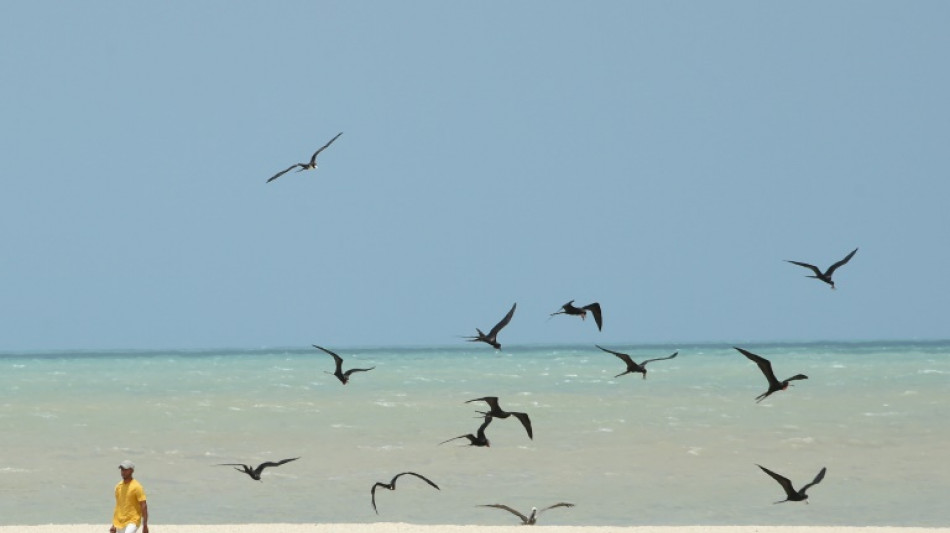
-
 Eurovision week's opening parade set to start the party
Eurovision week's opening parade set to start the party
-
Trump to announce trade deal with UK on Thursday: US media

-
 Dhoni says 'nothing to decide now' over retirement plans
Dhoni says 'nothing to decide now' over retirement plans
-
A bitter return for Iraqis kicked out of Europe
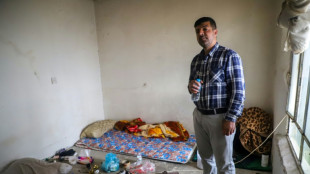
-
 Stocks rise further on growing trade deal hopes
Stocks rise further on growing trade deal hopes
-
Filipino pope could revive priestly vocations in Catholic bastion

-
 NZ Rugby posts $11.6 mn loss, admits financial model 'not sustainable'
NZ Rugby posts $11.6 mn loss, admits financial model 'not sustainable'
-
NZ Rugby posts $19.7mn loss, admits financial model 'not sustainable' financial model

-
 All eyes on Sistine Chapel chimney as conclave enters day two
All eyes on Sistine Chapel chimney as conclave enters day two
-
Digital voting breeds distrust among overseas Filipino workers
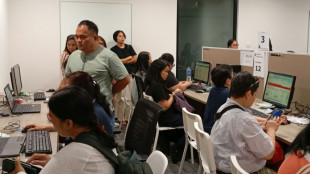
-
 Bank of England set to cut rate amid Trump's tariffs
Bank of England set to cut rate amid Trump's tariffs
-
Trump tariff plan brings Hollywood's struggles into focus
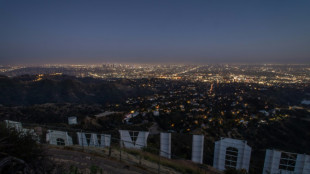
-
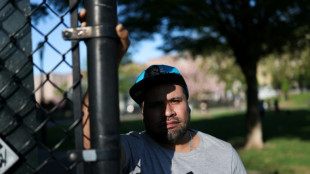 'Dream turned nightmare' for Venezuelan migrant deported from US by Trump
'Dream turned nightmare' for Venezuelan migrant deported from US by Trump
-
Malaysia Cybersecurity Center of Excellence Marks First Anniversary with New Partnerships, Scholarships and Expanded Programs

-
 California leads lawsuit over Trump's EV charging funding change
California leads lawsuit over Trump's EV charging funding change
-
Meta blocks access to Muslim news page in India

-
 PSG are deserving Champions League finalists, says Luis Enrique
PSG are deserving Champions League finalists, says Luis Enrique
-
Bolsonaro leads rally at site of 2023 Brazil insurrection

-
 Mexico City prepares to welcome millions for 2026 World Cup
Mexico City prepares to welcome millions for 2026 World Cup
-
Putin's order for three-day truce with Ukraine enters force

-
 Defiant Arteta says Arsenal were best team in Champions League despite painful exit
Defiant Arteta says Arsenal were best team in Champions League despite painful exit
-
US envoy Witkoff briefs UN Security Council on Gaza, other issues

-
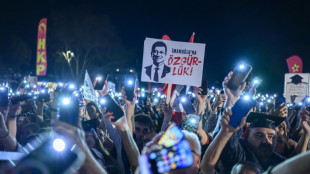 Tens of thousands take part in Istanbul rally for jailed mayor
Tens of thousands take part in Istanbul rally for jailed mayor
-
Pakistan warns will 'avenge' deaths from Indian strikes

-
 US Fed pauses rate cuts again and warns of inflation, unemployment risks
US Fed pauses rate cuts again and warns of inflation, unemployment risks
-
New accuser testifies against Weinstein in New York retrial

-
 Merz supports easing EU fiscal rules to boost defence spending
Merz supports easing EU fiscal rules to boost defence spending
-
PSG finish off Arsenal to reach Champions League final

-
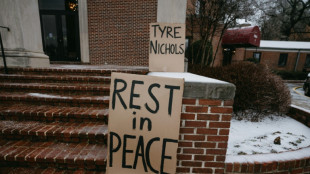 Ex-US police officers acquitted in beating death of Black motorist
Ex-US police officers acquitted in beating death of Black motorist
-
Curry ruled out for a week in NBA playoff blow to Warriors

-
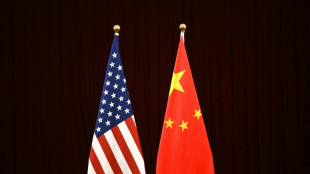 Global stocks mixed as markets eye weekend US-China trade talks
Global stocks mixed as markets eye weekend US-China trade talks
-
Fear and loathing: Trump film threat shocks Latin America

-
 Postecoglou hits back at Wenger over 'crazy' Spurs claim
Postecoglou hits back at Wenger over 'crazy' Spurs claim
-
US Fed pauses cuts again and flags inflation, unemployment risks

-
 Black smoke: Cardinals fail to elect new pope on first try
Black smoke: Cardinals fail to elect new pope on first try
-
Web archivists scrambling to save US public data from deletion

-
 Google shares plunge after Apple executive's court testimony
Google shares plunge after Apple executive's court testimony
-
Perrier ordered to remove water filters

-
 PGA of America to give away 3,000 Ryder Cup tickets
PGA of America to give away 3,000 Ryder Cup tickets
-
US safety officials slow operations at Newark airport after outage

-
 Brevis blitz dims Kolkata's IPL playoff hopes
Brevis blitz dims Kolkata's IPL playoff hopes
-
US Fed pauses rate cuts again, flags higher inflation risk

-
 McIlroy moves on after Masters win to defend PGA Truist title
McIlroy moves on after Masters win to defend PGA Truist title
-
Spurs star Maddison ruled out for rest of season

-
 OpenAI offers to help countries build AI systems
OpenAI offers to help countries build AI systems
-
Germany's new govt orders border police to reject most asylum seekers

-
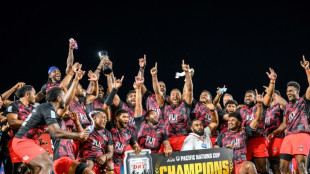 USA hosts Pacific Nations Cup finals with eye to '27 Rugby World Cup
USA hosts Pacific Nations Cup finals with eye to '27 Rugby World Cup
-
Six Bulgarians face long UK jail terms for spying for Russia

-
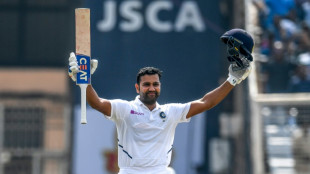 'Hitman' Sharma: Big-hitting leader of India's cricket dreams
'Hitman' Sharma: Big-hitting leader of India's cricket dreams
-
Wales fly-half Anscombe signs for French club Bayonne


UN top court raps Colombia over sea row with Nicaragua
The United Nations' top court on Thursday ordered the Colombian navy to stop interfering in Nicaraguan waters, ruling on a longstanding legal battle over maritime borders.
The International Court of Justice "finds that by interfering with fishing and marine research activities of Nicaraguan-flagged vessels ... in Nicaragua's exclusive economic zone ... Colombia's has violated Nicaragua's sovereign rights and jurisdiction," presiding judge Joan Donoghue said.
The court "finds by nine votes to six ... that the Republic of Colombia must immediately cease (this) conduct," she said, handing down the verdict at the ICJ's headquarters in The Hague.
In 2012 the ICJ, which rules in disputes between countries, awarded Nicaragua a swathe of disputed Caribbean Sea territory extending 200 nautical miles from its coastline.
But the following year, Nicaragua lodged a fresh case, accusing Colombia of ignoring the ruling.
It alleged Bogota had threatened to use force to back up its claims in the oil- and fish-rich region.
Nicaragua's lawyers also asked the ICJ make Colombia pay compensation for "the threat or use of force by the Colombian navy against Nicaraguan fishing boats".
Colombia denied the accusations, saying its presence in the region was "due to other imperatives", including international maritime rescue and the fight against drug trafficking.
Speaking outside court after the judgement, Colombia's representative, Carlos Gustavo Arrieta Padilla, said he still believed "the ruling is mainly in favour of Colombia".
"They (the judges) did not ask us to cease our presence in Nicaraguan waters... They never ordered us to leave ... the area," Arrieta said.
"The court has maintained the possibility of the Colombian navy being there and doing operations in the fight against organised crime in the area," he said.
- Legal ping-pong -
In a game of legal ping-pong, Bogota accused Managua of interfering with indigenous fishing rights.
The loss of fishing grounds because of the ICJ's 2012 ruling particularly affected the Raizal people, an English- and Creole-speaking community who are mainly descendants of slaves taken from Africa, Colombia's lawyers said.
However, Judge Donoghue said Colombia "failed to establish that the inhabitants of the San Andres archipelago, in particular the Raizales, enjoy fishing rights in waters now within Nicaragua's exclusive economic zone".
The court nonetheless "noted Nicaragua's willingness ... to negotiate with Colombia an agreement regarding access by members of the Raizales community to fisheries within Nicaragua's exclusive economic zone".
The best way to do this was through a bilateral agreement, Donoghue said.
The judges rejected Nicaragua's claim for compensation.
- Strained relations -
Although there are no land borders between Nicaragua, located in Central America, and Colombia, in South America, diplomatic relations have been strained for almost a century over disputed maritime limits.
Nicaragua finally took Colombia to the ICJ in 2001, and in 2012 it won several thousand square kilometres (miles) of territory in the southwestern Caribbean that had previously been Colombian.
Colombia, which was left with only seven islets, said at the time it would no longer recognise the court's jurisdiction on border disputes.
Nicaragua then went back to the court in 2013, alleging violations of the judgement by Colombia.
Judges at the ICJ ruled in 2016 that they had jurisdiction in the dispute, brushing aside Colombian objections that the court was not competent to hear the cases.
Countries are obliged to implement judgements by the Hague-based ICJ, which are final and cannot be appealed.
In rare situations where a country refuses, the matter can be referred to the UN Security Council by the complainant country for further action.
O.Karlsson--AMWN